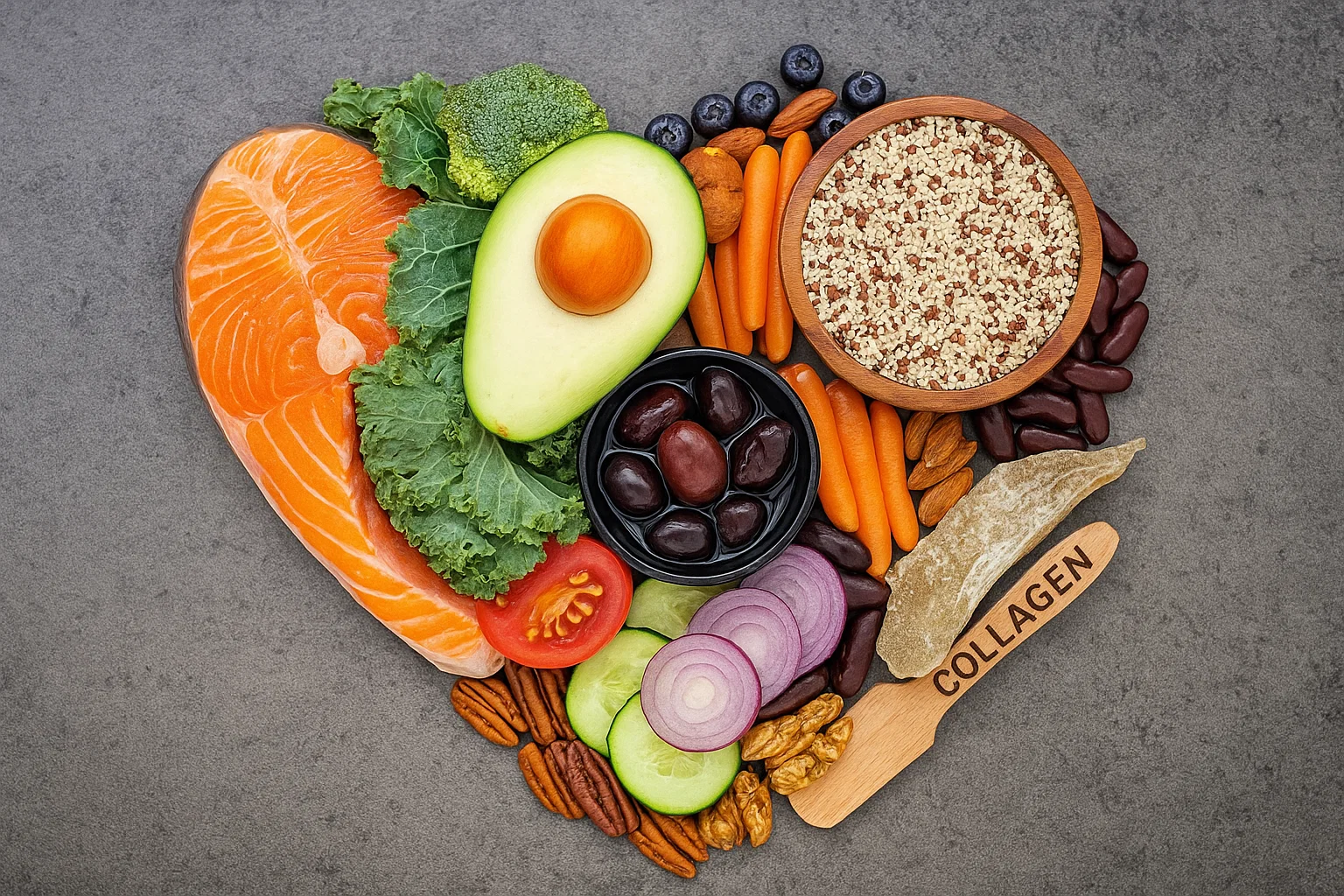- Your cart is empty
- Continue shopping

Types of Collagen – Best Collagen for Skin are essential for maintaining healthy skin, strong hair, and flexible joints. In this guide, we explain the main types of collagen, their benefits, natural sources, and how to choose the right supplement.
What Are the Types of Collagen and Why Are They Important?
Collagen is a protein that makes up about 30% of the body’s total proteins and plays a vital role in skin elasticity, hair strength, bone density, and joint health.
With age or exposure to harmful environmental factors, collagen production declines, leading to:
-
Wrinkles and loss of skin elasticity
-
Weak, brittle hair
-
Joint and cartilage issues
The Main Types of Collagen and Their Benefits
There are more than 28 types of collagen, but five types are the most common and beneficial:
-
Type I Collagen
-
Most abundant (90% of the body’s collagen).
-
Found in skin, tendons, bones, and teeth.
-
Benefits: Tightens skin, reduces wrinkles, strengthens hair and nails.
-
-
Type II Collagen
-
Found in cartilage.
-
Benefits: Improves joint flexibility, helps manage arthritis symptoms.
-
-
Type III Collagen
-
Found in muscles, blood vessels, and elastic skin.
-
Benefits: Supports cardiovascular health and maintains youthful skin.
-
-
Type V Collagen
-
Found in eyes and placenta.
-
Benefits: Supports eye health and assists in forming Type I collagen.
-
-
Type X Collagen
-
Found in growing cartilage and bones.
-
Benefits: Supports bone growth and tissue repair.
-
Best Natural Sources of Collagen
You can get different types of collagen from:
-
Foods: Bone broth, fish, eggs.
-
Supplements: Marine or bovine collagen powder or capsules.
💡 Tip: Marine collagen is absorbed faster and is preferred for skin and hair.
How to Choose the Best Collagen
-
For skin and hair: Marine collagen (Type I & III).
-
For joints: Bovine or chicken collagen (Type II).
-
For overall use: Multi-collagen blends.
FAQ on Types of Collagen
-
When should I start taking collagen? After age 25, when production declines.
-
Side effects? Generally safe, but may cause mild digestive discomfort.
-
How long to see results? Usually 4–12 weeks.
-
Can food alone provide enough collagen? Yes, but supplements offer higher doses and faster absorption.
-
Marine vs bovine collagen? Marine absorbs faster; bovine suits skin and joints.
-
can I take different types of collagen together?
Yes. Multi-collagen supplements combine various types to target skin, hair, nails, joints, and bones at the same time.How can I naturally boost collagen without supplements?
Eat collagen-rich foods like bone broth, fish, eggs, and citrus fruits, and avoid smoking, excessive sun exposure, and refined sugar.Can I use collagen topically for skin benefits?
Topical collagen can hydrate the skin’s surface, but oral collagen supplements provide deeper benefits like improving elasticity.
Collagen for Skin Health
Collagen keeps skin firm and wrinkle-free. Benefits include reducing fine lines, improving elasticity, and deep hydration.
Marine collagen (Type I & III) is ideal for dry, sagging skin.
Marine Collagen for Hair
Due to its small molecules, marine collagen is easily absorbed, improving hair shine, thickness, and reducing hair loss.
Best Collagen for Joint Health
Bovine or chicken collagen (Type II) regenerates cartilage and improves mobility. Pairing with Vitamin C boosts absorption.
Choosing the Right Supplement
-
Source: marine, bovine, or chicken
-
Type: Type I for skin, Type II for joints
-
Added ingredients: Vitamin C or hyaluronic acid
Natural Food Sources
Bone broth, fish, seafood, egg whites, leafy greens rich in Vitamin C.
When to Start Collagen
Preferably after age 25 or at the first signs of aging or joint problems.
Understanding Types of Collagen – Best Collagen for Skin helps you choose the right supplement for your goals:
For skin & hair: Marine collagen (Type I & III)
For joints: Bovine or chicken collagen (Type II)
For overall: Multi-collagen blend
